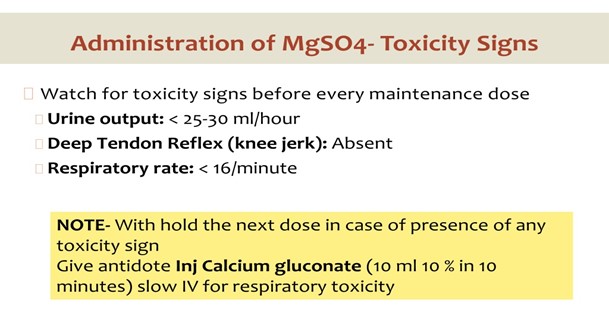Clinical Features
Clinical Features ( 16 Questions)
A nurse is caring for a client who has severe preeclampsia and is receiving magnesium sulfate infusion.
Which of the following assessments is most important for the nurse to monitor?
Blood pressure is not the most important assessment for a client receiving magnesium sulfate.
Blood pressure is a manifestation of preeclampsia, but it does not indicate magnesium toxicity.
Urine output is not the most important assessment for a client receiving magnesium sulfate.
Urine output should be at least 25 to 30 mL/hr to promote adequate excretion of magnesium, but it does not reflect the level of magnesium in the blood.
Deep tendon reflexes.
The nurse should monitor the client’s deep tendon reflexes to assess for signs of magnesium toxicity, which can cause respiratory depression, cardiac arrest, and coma. Magnesium sulfate is given to prevent seizures in clients with severe preeclampsia, but it can also have adverse effects on the neuromuscular system.

Fetal heart rate is not the most important assessment for a client receiving magnesium sulfate.
Fetal heart rate is important to monitor for signs of fetal distress, but it does not indicate maternal magnesium toxicity.
Deep tendon reflexes.
The nurse should monitor the client’s deep tendon reflexes to assess for signs of magnesium toxicity, which can cause respiratory depression, cardiac arrest, and coma. Magnesium sulfate is given to prevent seizures in clients with severe preeclampsia, but it can also have adverse effects on the neuromuscular system.

Choice A is wrong because blood pressure is not the most important assessment for a client receiving magnesium sulfate.
Blood pressure is a manifestation of preeclampsia, but it does not indicate magnesium toxicity.
Choice B is wrong because urine output is not the most important assessment for a client receiving magnesium sulfate.
Urine output should be at least 25 to 30 mL/hr to promote adequate excretion of magnesium, but it does not reflect the level of magnesium in the blood.
Choice D is wrong because fetal heart rate is not the most important assessment for a client receiving magnesium sulfate.
Fetal heart rate is important to monitor for signs of fetal distress, but it does not indicate maternal magnesium toxicity.
